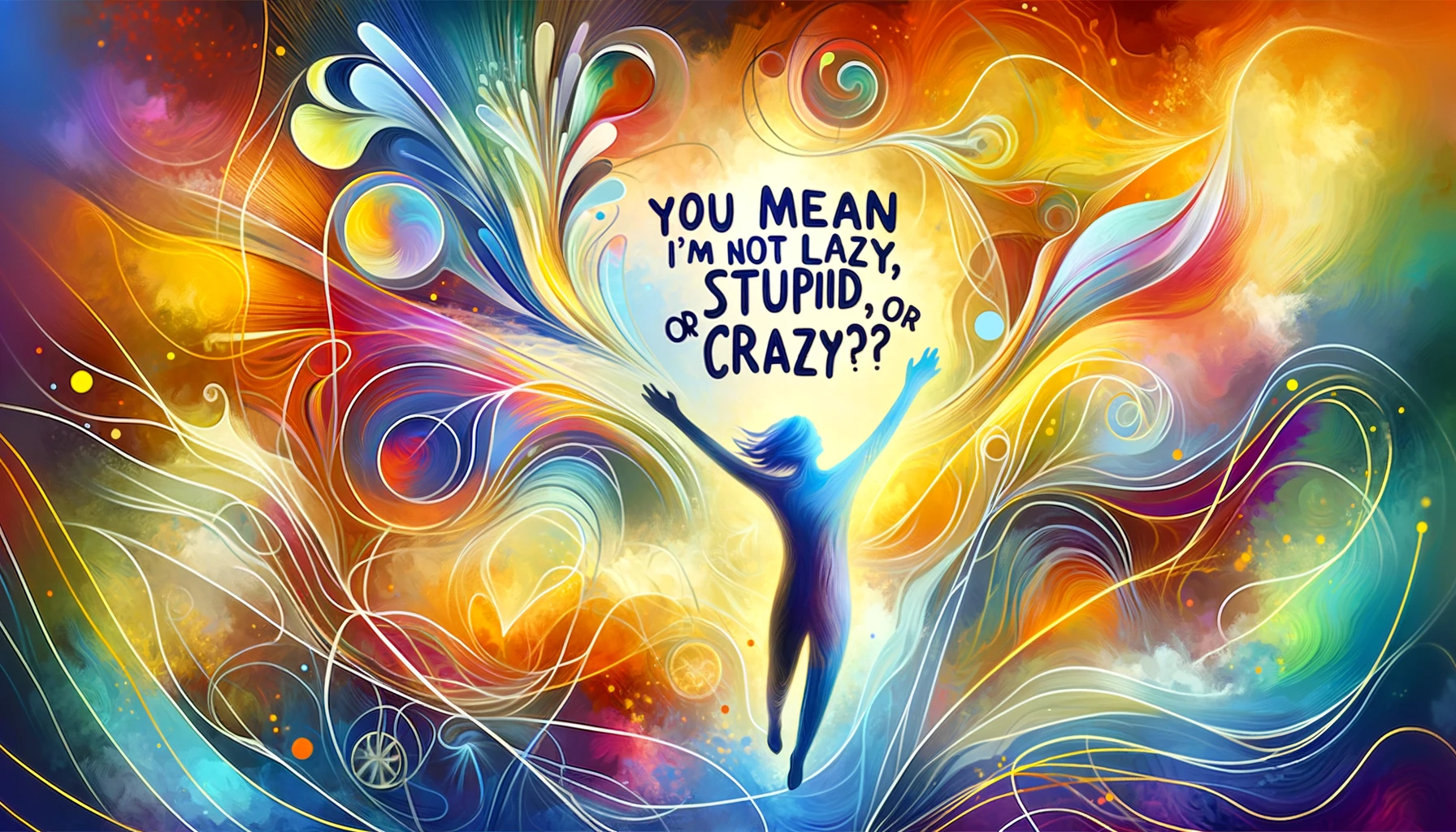„You Mean I’m Not Lazy, Stupid or Crazy?“ by Kate Kelly and Peggy Ramundo.
This was one of those books that I bought just for the title. How good is this flipping title, please? I was researching ADHD literature at the time and this is an old classic, first published in 1993. While this is costing the book novelty ratings for todays times, it will still provide you with a deep down understanding of an ADHD brain. What I especially loved about this is, that it was written by women. ADHD in women just presents itself differently – which is now proven by science – and the authors style and practicability has been SOOO helpful.
Let me just quote some passages briefly: “Housekeeping is the Job Description from Hell for ADDers”- and I felt that. My household is a MESS most of the time and even though I know all the tricks (so I thought in my 20s) and bought all those times and planners and checklists, I still couldn’t get a hang of it. And this book explained me my WHY and how to fix it. Now, my home is still a mess at times, but nothing like the mess it used to be.
1. Readability ★★★★☆
The book is accessible and engaging, making it easy to understand, even for those without a background in psychology or ADHD. It uses simple, relatable language to explain complex concepts, and the conversational tone adds warmth and humor to what could otherwise be a heavy topic. However, at times the structure can feel slightly disjointed, with topics shifting without deep transitions, which could confuse some readers.
2. Practicality ★★★★☆
The book offers a wealth of practical advice for adults with ADHD, including coping strategies, organizational tips, and techniques for improving productivity and managing emotions. It also acknowledges the emotional toll ADHD can take and offers advice on self-acceptance. The only limitation is that some strategies may feel basic or repetitive for those already familiar with ADHD management, especially for those seeking a more clinical or scientific approach.
3. Depth of Research ★★★☆☆
While the authors provide anecdotal evidence and personal experience, the book lacks extensive academic or clinical references. This makes it accessible for the average reader but might leave those looking for evidence-based strategies wanting more. The advice is more experience-based than grounded in current research, which can limit its appeal to those looking for the latest insights into ADHD.
4. Engagement ★★★★★
The book excels at keeping the reader engaged. Its humorous and non-judgmental tone makes it a page-turner for many adults with ADHD who feel misunderstood. The use of real-life examples, personal anecdotes, and the validation of common ADHD challenges resonate with readers on a personal level, making them feel seen and supported. The title itself reflects this, drawing in those who feel stigmatized by their symptoms.
Just look into it, Ill post a few photos of special pages… it is amazing!
Potentially the greatest impact on me had the verious „case studies“ and real life examples. Instead of feeling like the Greatest Looser, the stories helped me to feel more empathetic with myself. ADD or ADHD is a full time job at times. Add another little life and it get’s overwhelming more often than I like to admit.
So hearing empathetic, friendly words of encouragement has never been more welcome!
5. Novelty ★★★☆☆
When originally published, „You Mean I’m Not Lazy, Stupid or Crazy?“ was quite groundbreaking in addressing ADHD in adults, a topic that was largely ignored at the time. However, since its release, other books have tackled ADHD with more updated research and perspectives. The book’s novelty lies in its down-to-earth, peer-to-peer tone rather than introducing radically new concepts or therapies.
6. Relevance to Mental Health ★★★★☆
The book is highly relevant for adults – especially women! – struggling with ADHD, as it validates the emotional challenges they face, including low self-esteem, frustration, and the stigma of being perceived as lazy or disorganized. It speaks to the psychological aspect of ADHD and how it intertwines with mental health, but it stops short of offering deeper therapeutic insights into comorbid conditions such as anxiety or depression, which are common among people with ADHD.
Finding ways to manage your ADD / ADHD better can obviously impact your mental health positively. You might even find that using your ADHD skills to improve your life and career is an achievable goal –> and who would not want that, right?
7. Includes Exercises ★★★★☆
There are several practical tips and suggested activities, especially in the second half of the book, aimed at helping the reader manage their ADHD. While these are useful, they are mostly informal and presented as personal advice rather than structured exercises with measurable outcomes. The suggestions are more about day-to-day management than therapeutic exercises, so readers may need additional resources if they want more structured guidance.
This is one of the must read book in my ADHD-in-adults-awareness-series and I highly recommend you check out the others in this series, too!
- „Driven to Distraction“ by Edward M. Hallowell and John J. Ratey
- „The ADHD Effect on Marriage“ by Melissa Orlov
- „The Disorganized Mind: Coaching Your ADHD Brain to Take Control of Your Time, Tasks, and Talents“ by Nancy A. Ratey
- „Taking Charge of Adult ADHD“ by Russell A. Barkley
- „ADHD 2.0“ by Edward M. Hallowell and John J. Ratey

No responses yet